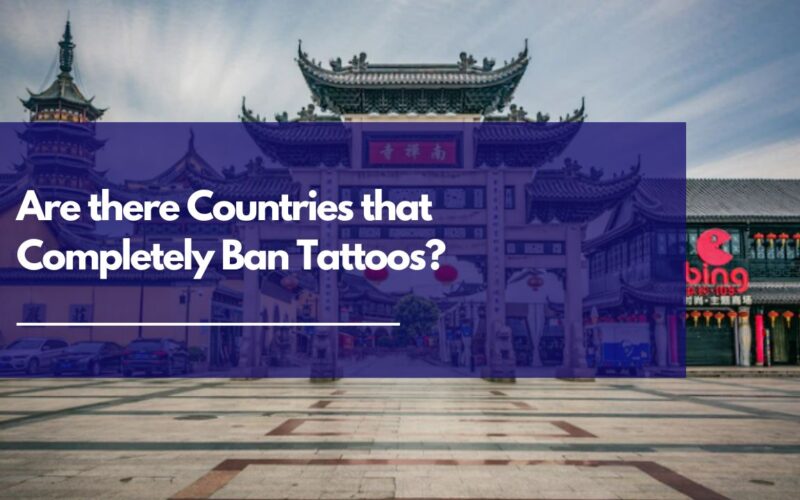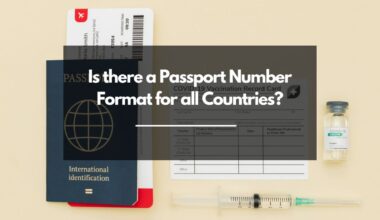As an Amazon Associate, I earn a small commission from qualifying purchases. Learn more about this.
Imagine planning a trip to a beautiful foreign country, only to realize that your tattoos might get you into trouble upon arrival.
This is a reality for many tattooed tourists and citizens in various countries worldwide, where tattoos are not allowed due to cultural, religious, or legal restrictions.
In some nations, the limitations are on the act of tattooing itself, making it illegal to operate a tattoo parlor or perform tattooing. In others, having visible tattoos can lead to issues, especially if the tattoos are deemed offensive, politically sensitive, or religiously inappropriate.
But this also doesn’t deter the fact that tattoo have a historical and cultural significance in many parts of the world.
For instance, in places like New Zealand and Samoa, tattoos are an integral part of the local culture and heritage. However, in other nations, tattoos are viewed with skepticism and concern, often associated with criminal activity, gangs, or rebellion.
Now, let’s get into the list of these countries that don’t allow tattoos:
Are there Countries that Completely Ban Tattoos?
It’s difficult to pinpoint countries where tattoos are entirely illegal as tattoo regulations can often be complex and multifaceted, falling into gray areas of law and societal norms.
Generally, countries might not have explicit laws banning tattoos altogether, but they can have stringent restrictions on tattoo artists and parlors, effectively making it almost impossible to get a tattoo legally.
For example:
- North Korea: While it might not be explicitly stated in their law books that tattoos are illegal, the government’s strict control over personal expression and appearance makes it nearly impossible for citizens to get tattoos legally. Those with tattoos might face severe punishment.
- Iran: Here, tattoos are seen as a symbol of Western influence and are therefore frowned upon. The government has enforced regulations that prohibit tattoo parlors from operating. Individuals with visible tattoos can face scrutiny, discrimination, and legal issues. If you’re traveling to Iran, it’s advisable to cover your tattoos to avoid unwanted attention or problems.
Even in countries where tattoos are not explicitly illegal, individuals with tattoos might still face societal discrimination, judgment, or exclusion from certain public places and facilities, as seen in places like Japan, Singapore, and South Korea.
It’s important to note that even if a country does not have a nationwide ban on tattoos, certain states, provinces, or cities within that country might impose their own restrictions or bans.
Additionally, even if tattoos are legal in a country, there might be specific laws and regulations regarding the age of consent for getting a tattoo, the licensing of tattoo artists and parlors, and the types and styles of tattoos allowed (for example, tattoos of religious or culturally sensitive symbols might be prohibited).
10 Countries that Don’t Allow Tattoos (Grey Area Countries)
1. China:

China does not have a nationwide ban on tattoos, but there are restrictions.
For example, the Chinese government banned tattoos from being shown on television as part of a move to ensure the media represents “core socialist values.”
Additionally, individuals with tattoos may be barred from joining the military and certain government positions. Public attitudes towards tattoos in China can also be quite conservative.
2. South Korea

In South Korea, the art of tattooing is technically legal but heavily regulated. Only licensed medical doctors are legally allowed to tattoo individuals.
The heavy regulation effectively renders most traditional tattooing illegal, and anyone caught getting inked from an unlicensed artist could face fines. Despite the growing popularity of tattoos among young Koreans, the legal and social stigma remains.
3. United Arab Emirates
In the United Arab Emirates, tattoos aren’t technically illegal, but cultural norms and religious beliefs strongly discourage them.
Public display of tattoos, especially large or offensive designs, may be frowned upon. It’s suggested that tattoos be covered in public to respect local customs and avoid potential issues.
4. Japan

Now, onto Japan – a country known for its rich tattoo history, but also for its modern restrictions.
Tattoos in Japan are closely associated with the Yakuza (organized crime).
Many public places like gyms, swimming pools, and onsens (hot springs) often ban individuals with tattoos from entry. Although this is slowly changing, particularly with the influx of tattooed foreign tourists, it’s still something to be mindful of when visiting Japan.
5. Singapore
In Singapore, tattoos are legal, but there’s a significant social stigma attached to them.
This small Southeast Asian nation holds conservative views on self-expression, and tattoos are often associated with gang affiliation.
While you won’t face legal repercussions for having tattoos here, be prepared for potential societal judgment and exclusion from certain public facilities.
6. Malaysia

Here, tattoos are seen as a symbol of Western influence and are therefore frowned upon.
The government has enforced regulations that prohibit tattoo parlors from operating. Individuals with visible tattoos can face scrutiny, discrimination, and legal issues. If you’re traveling to Iran, it’s advisable to cover your tattoos to avoid unwanted attention or problems.
7. Sri Lanka
Here, tattoos are seen as a symbol of Western influence and are therefore frowned upon.
The government has enforced regulations that prohibit tattoo parlors from operating.
Individuals with visible tattoos can face scrutiny, discrimination, and legal issues. If you’re traveling to Iran, it’s advisable to cover your tattoos to avoid unwanted attention or problems.
Conclusion
While it’s challenging to find countries with total bans on tattoos, many nations have restrictions, regulations, and societal norms that heavily discourage or limit the practice of tattooing.
It’s always essential for individuals, especially travelers, to be aware of and respect these laws and cultural norms to avoid potential legal issues and cultural disrespect.







